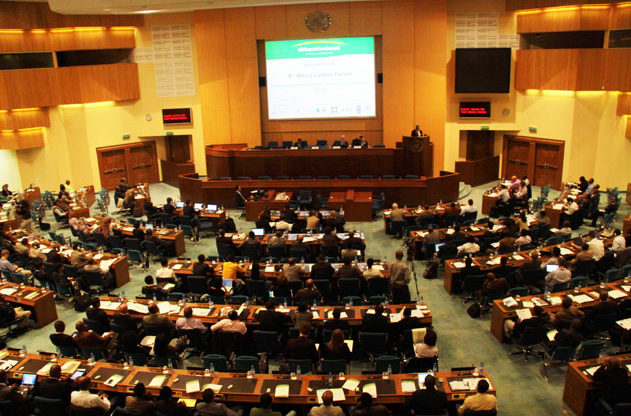The 4th Africa Carbon Forum (ACF) held in Addis Ababa, Ethiopia from 18 – 20 April 2012, opened its doors to over 1,000 registered participants from across the globe to foster a discussion on climate change and carbon finance in Africa.
The message resonating this year from Addis was that Africa represents a golden opportunity for a green future. “The vast potential represented by African countries in the fight against climate change cannot be underestimated,” said Christiana Figueres, Executive Secretary of United Nations Framework Convention on Climate Change (UNFCCC). “The Africa Carbon Forum is where potential projects and developers and funders can meet, exchange ideas, and – it is hoped – take the concrete steps toward greening Africa’s future.”

Bird’s eye view of the opening plenary of the fourth Africa Carbon Forum in Addis Ababa, Ethiopia.
Apart from UNEP Risø Centre, the organizing partners of this year’s Africa Carbon Forum included the African Development Bank, the African Climate Policy Centre, the International Emissions Trading Association (IETA), United Nations Development Programme (UNDP), United Nations Environment Programme (UNEP), United Nations Framework Convention on Climate Change (UNFCCC), and the World Bank and its World Bank Institute. The Forum was also supported by the Ethiopian Environmental Protection Agency.
The conference included presentations by experts in the field as well as workshops that allowed for a dialogue among policymakers, project developers, and investors on topics such as the future of the Clean Development Mechanism (CDM) in Africa, climate-smart agriculture, public–private partnerships, and project funding on the continent.
Africa has enormous potential for sustainable, climate-friendly development, with an abundance of renewable energy resources to satisfy future energy needs. Despite this, Africa continues to face enormous obstacles to investment and lags behind other parts of the world in taking advantage of carbon finance to develop climate friendly projects and to encourage the transfer of cutting edge technologies and know-how. It is a continent that has the potential to make a significant impact on mitigating climate change through its extensive forest resources. To achieve this, further investment needs to be facilitated for low carbon projects. CDM is in the process of standardization to simplify rules for low income countries. These topics, among others, were discussed at the Africa Carbon Forum.
The Africa Carbon Forum is held under the Nairobi Framework, an initiative launched to help developing countries, particularly those in sub-Saharan Africa, to increase their participation in the Clean Development Mechanism.
About the CDM
The CDM allows emission reduction projects in developing countries to earn certified emission reductions (CERs), each equivalent to one tonne of CO2. CERs can be traded, and used by industrialized countries to meet a part of their emission reduction targets under the Kyoto Protocol. The CDM assists countries in achieving sustainable development and emission reductions, while giving industrialized countries some flexibility in how they meet their emission targets.